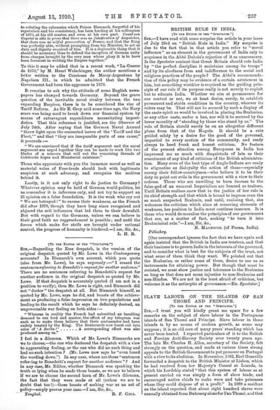ITO TER EDITOR OP TER "Spscxxroa.1 Sra,—Regarding the Ems despatch,
is the version of the original despatch quoted by Mr. Lowe in the Contemporary
accurate? In Bismarck's own account, which you quote
(also from Mr. Lowe), he says expressly :—" I erased the sentences referring to Benedetti's request for another audience."
There are no sentences referring to Benedetti's request for another audience in the original despatch as quoted by Mr.
Lowe. If that despatch is accurately quoted (I am not in a position to verify), then Mr. Lowe is right, and Bismarck did not " doctor " the despatch at all. But Bismarck himself, as quoted by Mr. Lowe, says he did, and boasts of the achieve- ment as producing a false impression on two populations and leading to the result which he says he definitely desired, an ungovernable war feeling on both sides :—
"Whereas in reality the French had submitted an insulting demand to our lord and master, the effect of my telegram was such as to make them believe that their ambassador had been rudely treated by the King. The Boulevards now burst out into cries of 'A Berlin ! ' A corresponding effect was also produced among us."
I feel in a dilemma. Which of Mr. Lowe's Bismarcks are we to choose,—the one who doctored the despatch with a view to aggravating feeling, or the one who did no such thing and had no such intention P (Mr. Lowe now says be "even toned the wording down.") In any case, where are those "sentences referring to Benedetti's request for another audience " ? And in any case, Mr. Editor, whether Bismarck was speaking the truth or lying when be made these boasts, as we are to believe if we are to choose the second horn of Mr. Lowe's dilemma, the fact that they were made at all (unless we are to doubt that too !)—these boasts of making war as an act of policy—amply proves your case.—I am, Sir, &a.,






































 Previous page
Previous page